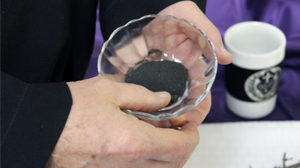Ash Wednesday
Scripture:
Joel 2:12-18
2 Corinthians 5:20-6:2
Matthew 6:1-6, 16-18
Reflection:
The first reading today from the prophet Joel proclaims what we all know—it is Ash Wednesday, the beginning of Lent and of our preparation for the feast of Easter. “Blow a trumpet in Zion! Proclaim a fast, call an assembly; Gather the people, notify the congregation…”.
What is it that makes Ash Wednesday so memorable and, in fact, a day where so many people stand in line to receive the mark of ashes on their foreheads—even people who seldom darken a church door for the rest of the year? Perhaps it is the raw truth of this ritual. The traditional formula that is still an option says it bluntly: “Remember. You are dust and unto dust you shall return.” This is, in fact, a quotation for the book of Genesis (3:19) when God, disappointed in the sin of Adam and Eve, warns them that the threat of death looms before them. The account of creation in Genesis 2 portrayed God’s creative act as taking “dust” or “clay”, forming it into a human shape, and then breathing into the human’s nostrils the “breath of life.” So, yes, we are “dust” but we also carry the divine life within us. Because of this, Genesis notes, “the man became a living being” (Gen 2:7).
So we are, in the poetic image of Genesis, a bag of clay with the breath of God inside—human, prone to failure and sin, but also carrying within us a divine life-breath, made “in the image and likeness of God.”
We need to recall both dimensions during this Lent. A passage from Jesus’ Sermon on the Mount in Matthew’s Gospel is the traditional gospel reading for this day. “Take care not to perform righteous deeds in order that people may see them,” Jesus tells his disciples. When they would perform the traditional acts of Jewish piety— “righteous deeds” such as prayer, fasting, and almsgiving—these should be done to glorify and praise God, not to win human favor. Jesus speaks here of motivation; throughout the gospel he challenges those who are “hypocritical”—seeming to be religious but having hearts without compassion or integrity.
At the same time, Jesus also calls his disciples to be “the light of the world,” “the salt of the earth”—not putting their light under a bushel basket but letting the good example of their lives be a witness and an inspiration for others. Authentic signs of goodness are needed for the sake of the world.
In his powerful encyclical on the environment, Laudato Si’ (“Praise you, Lord”), Pope Francis reminds us of the cumulative public impact of what he calls “small gestures of love”. He recalls the wisdom of St. Therese of Lisieux who “invites us to practice the little way of love, not to miss out on a kind word, a smile or any small gesture which sows peace and friendship…simple daily gestures which break with the logic of violence, exploitation and selfishness.” He goes on to say, “Love, overflowing with small gestures of mutual care…makes itself felt in every action that seeks to build a better world.” The Church’s mission, the Pope declares, is to “set before the world the ideal of a ‘civilization of love.”
For whatever reasons, our world, including our own beloved country, seems deeply divided these days, with coarse political discourse filling the airwaves, so much violence, and steps being taken that threaten the poor, the vulnerable and the stranger. Perhaps this Lent we, as Catholics and followers of Jesus, are called to live a life of greater integrity and to give a public witness that counters a culture of death with the ideal of a “civilization of love.” Perhaps we should wear our ashes without embarrassment in every public place we go this Ash Wednesday, reminding ourselves and our fellow citizens that we are God’s handiwork, a bag of clay, yes, but also carrying the divine life breath within us.
Fr. Donald Senior, C.P. is President Emeritus and Professor of New Testament at Catholic Theological Union. He lives at the Passionist residence in the Hyde Park neighborhood of Chicago.
